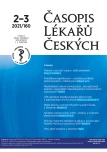Principles of evidence-based medicine: from Robert Koch’s postulates to a current EBM concept
Authors:
Vladimír Bencko
Authors‘ workplace:
Ústav hygieny a epidemiologie 1. LF UK a VFN v Praze
Published in:
Čas. Lék. čes. 2021; 160: 93-96
Category:
History of Medicine
Overview
The aim of the article is to describe the development of the principles of medicine based on the evidence (EBM) based on postulates of Robert Koch, Nobel prize winner, protagonist of the "Golden Age" medical bacteriology, founder of a concept of modern microbiology and infectology. Kochs’ work led to the discovery of a causal relationship between exposure to a specific pathogen and disease on the example of identifying the cause of anthrax – Bacillus anthracis, a disease whose symptoms vary depending on the mode of transmission (gastrointestinal ingestion, cutaneous form on contact and pulmonary manifestations when inhaled). Tuberculosis caused by Koch’s bacillus, Mycobacterium tuberculosis, yet still affecting 1.7 billion people (about 25 % of the world's population), in 95 % of cases in developing countries, where poverty and high prevalence of HIV are part of everyday life. Koch also discovered Vibrio cholerae, the pathogen responsible for seven recorded pandemics, and hitherto sporadic epidemics in recent years.
The main contribution of the Kochs’ four postulates formulation was the principle, which helped to reveal the causal relationship between the pathogenic microbe to protrude infectious disease and obtain reliable evidence in improving credibility of diagnosis of infectious diseases.
Other stages in the development of EBM were formulated by Bradford Hill in his nine principles, which are valid as well for noncommunicable diseases. The subjects of discussion are limitations and restrictions of present EBM and its essentials and the use in rational preventive, diagnostic and treatment strategies.
Keywords:
Evidence based medicine – EBM – Robert Koch – Bradford Hill – causality – infectious diseases – noncommunicable diseases – four postulates – nine principles
Sources
- Karamanou M, Panayiotakopoulos G, Tsoucalas G et al. From miasmas to germs: a historical approach to theories of infectious disease transmission. Infez Med 2012; 20 : 58–62.
- Science Museum. Cholera in Victorian London. Dostupné na: http://broughttolife.sciencemuseum.org.uk/broughttolife/techniques/miasmatheory
- Theories of contagion. Infectious Diseases at the Edward Worth Library, 2021. Dostupné na: http://infectiousdiseases.edwardworthlibrary.ie/theory-of-contagion
- Sakula A. Robert Koch: centenary of the discovery of the tubercle bacillus, 1882. Thorax 1982; 37(4): 246-251.
- Riedel S. Anthrax: a continuing concern in the era of bioterrorism. Proc (Bayl Univ Med Cent) 2005; 8 : 234-243.
- Koch R. Die Ätiologie der Milzbrandkrankheit, begründet auf die Entwicklungsgeschichte des Bacillus Anthracis. Beiträge zur Biologie der Pflanzen 1876 (2): 277–310.
- Centers for Disease Control and Prevention. A history of anthrax. CDC, 2020 Nov 20. Dostupné na: www.cdc.gov/anthrax/resources/history/index.html
- Evans A. Limitations of Koch’s postulates. Lancet 1977; 310(8051): 1277-1278.
- Falkow S. Molecular Koch's postulates applied to bacterial pathogenicity – a personal recollection 15 years later. Nature Rev Microbiol 2004; 2(1): 67-72.
- Bencko V, Vostal J. Air pollution by solid particles and public health: when we can conclude on causality. Cent Eur J Publ Health 1999; 7(2): 64-66.
- Akobeng A. Principles of evidence-based medicine. Arch Dis Child 2005; 90(8): 837-840.
- Blunt CJ. Hierarchies of evidence. Dostupné na: http://cjblunt.com/hierarchies-evidence
- Grimes DJ. Koch’s Postulates – then and now. Microbe 2006; 1 : 223-228.
- Fletcher GS. Evidence-based approach to prevention. UpToDate, 2020 Aug 31. Dostupné na: www.uptodate.com/contents/evidence-based-approach-to-prevention
- Lewis S, Orland B. The importance and impact of evidence-based medicine. J Manag Care Pharm 2004; 10 (5 Suppl. A): S3-S5.
- Croft P, Malmivaara A, van Tulder M. The pros and cons of evidence-based medicine. Spine 2011; 36 (17): E1121-E1125.
- Howard-Jones N. Robert Koch and the cholera vibrio: a centenary. BMJ 1984; 288 : 379-381.
Labels
Addictology Allergology and clinical immunology Angiology Audiology Clinical biochemistry Dermatology & STDs Paediatric gastroenterology Paediatric surgery Paediatric cardiology Paediatric neurology Paediatric ENT Paediatric psychiatry Paediatric rheumatology Diabetology Pharmacy Vascular surgery Pain management Dental HygienistArticle was published in
Journal of Czech Physicians

2021 Issue 2-3
- Advances in the Treatment of Myasthenia Gravis on the Horizon
- Possibilities of Using Metamizole in the Treatment of Acute Primary Headaches
- Metamizole at a Glance and in Practice – Effective Non-Opioid Analgesic for All Ages
- Metamizole vs. Tramadol in Postoperative Analgesia
- Spasmolytic Effect of Metamizole
-
All articles in this issue
- Allocation of scarce resources in a pandemic
- COVID-19 antibody testing: examination of the antibody response to coronavirus in common practice
- Stress management techniques for healthcare workers as an important professional tool to fight (not only) COVID-19 pandemics
- Use of cognitive-behavioral approach to overweight and obesity therapy in STOB activities
- Non-alcoholic fatty liver disease – how to effectively fight the nowadays most common liver disease?
- ATP-sensitive potassium channels: key players in pathophysiology of many diseases
- The risk of insect-borne diseases transmission in the Czech Republic and Slovakia
- Principles of evidence-based medicine: from Robert Koch’s postulates to a current EBM concept
- On the origins of European gynaecology: the archaeological and literary sources to the development of gynaecology in Greece before 500 BC
- Computer vision syndrome – symptoms and prevention
-
Gertrude Belle Elionová
(1918–1999) - Zamyšlení nad Spolkem českých lékařů v Praze
-
K devadesátinám prof. MUDr.
Jany Pařízkové, DrSc. - Sedmdesát let prof. Aleše Žáka
- Vzpomínka na prof. Rostislava Koďouska
- ÚVODEM
- Pitvy před Vesaliem a Jeseniem
- Špitální péče řádu sv. Jana na evropské půdě do 18. století
- Představujeme publikaci
- Journal of Czech Physicians
- Journal archive
- Current issue
- About the journal
Most read in this issue
- COVID-19 antibody testing: examination of the antibody response to coronavirus in common practice
- The risk of insect-borne diseases transmission in the Czech Republic and Slovakia
- Computer vision syndrome – symptoms and prevention
- Non-alcoholic fatty liver disease – how to effectively fight the nowadays most common liver disease?
